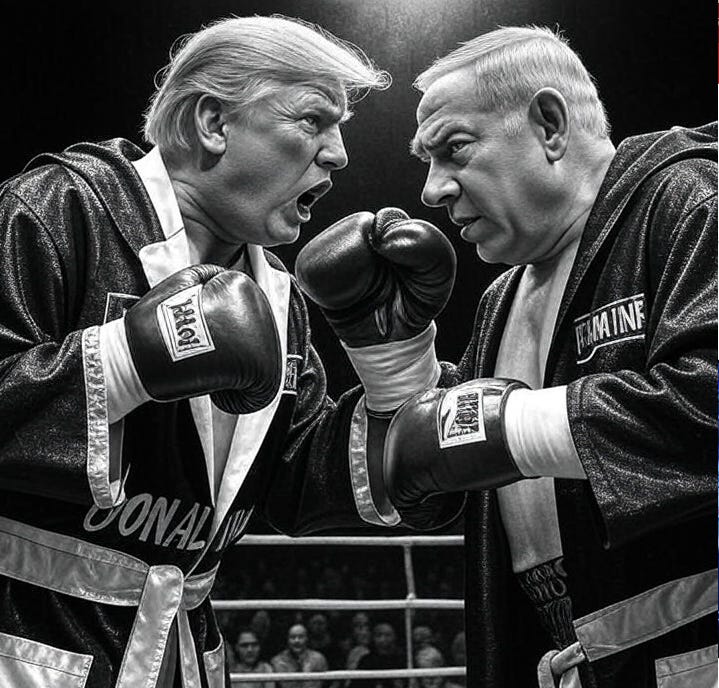Donald Trump and Benjamin Netanyahu, the duo that reshaped U.S.-Israel relations with the Abraham Accords and the Jerusalem embassy move, are reportedly at odds.
Israeli Army Radio and outlets like Israel Hayom say Trump’s gone silent on Bibi, frustrated by what he sees as a lack of reciprocity. Meanwhile, Netanyahu’s team seems caught off guard, unsure how to navigate a U.S. president who plays by his own rules. This isn’t just a diplomatic speed bump—it’s a fracture that could shift alliances, rattle markets, and upend the Middle East.
So, what’s driving the chill, and why should you care?
Let’s start with the facts. Trump’s second term has brought a renewed focus on rethinking U.S. foreign policy. His advisors, from tech moguls to policy wonks, are pushing to prioritize domestic needs—think infrastructure, border security—over open-ended overseas commitments. Israel, which gets about $3.8 billion a year in U.S. military aid, is part of that conversation.
According to these Israeli Army Radio (GLZ) reports, Trump’s team told Israeli Minister Ron Dermer that the president feels “disrespected” by Netanyahu’s approach, particularly on issues like Gaza and broader regional strategy.
Now, it’s worth mentioning that these reports are based on a single primary source—Israeli Army Radio—and lack direct confirmation from Trump’s team or official U.S. statements. The narrative of Trump feeling “disrespected” aligns with earlier tensions, like Trump’s frustration over Netanyahu congratulating Biden in 2020, but the 2025 context relies heavily on unverified claims from Israeli media.
Not everyone is convinced yet that the split is meaningful. Independent journalist Glenn Greenwald broke down the alleged split recently on his show System Update:
Netanyahu, for his part, is juggling a high-stakes game. At home, he’s managing a fragile coalition and ongoing conflicts with Hamas and Hezbollah. He’s long relied on unwavering U.S. support, a bipartisan constant for decades.
But Trump’s approach—transactional, unpredictable—doesn’t fit the old mold. Sources suggest Bibi’s team pushed to keep aid flowing without new conditions, while Trump’s camp wants concessions, possibly a Gaza ceasefire or deeper cooperation on energy deals. When those talks stalled, the silence set in.
This rift isn’t just about two men—it’s about a world in flux. On one side, there’s pressure to rethink America’s role as the global benefactor. Many in the United States, on both sides of the political aisle, ask why billions go abroad when bridges crumble and home and veterans are sleeping in the streets.
On the other hand, Israel’s backers—left and right—argue that the alliance is a cornerstone of U.S. influence, countering Iran and stabilizing a volatile region.
Both perspectives have weight: a nation’s first duty is to its people, but global security doesn’t come cheap. The Trump-Netanyahu standoff forces a question we’ve dodged too long: What’s the true cost of our alliances, and who pays it?
If the silence persists, Trump might push for a leaner aid package or pivot to other partners, like Saudi Arabia, to expand deals like the Abraham Accords. Netanyahu could double down, banking on Congress’s bipartisan support to weather the storm, or he might offer a gesture, like a public nod or a policy tweak, to ease tensions.
Either way, the outcome matters. The Foreign Policy establishment assures us that a weaker U.S.-Israel bond could embolden adversaries like Iran or China, who are watching very closely. But a renegotiated partnership, with clearer terms, might set a new standard for how America engages the world—one that balances generosity with accountability.
Don’t let the headlines fool you into thinking this is just a personality spat. It’s a stress test for an alliance that has defined global politics for generations. Whether you’re cheering for a humbler foreign policy or worried about a fractured West, this moment demands your attention. The choices made in Washington and Jerusalem won’t just shape the Middle East—they’ll shape the future of power itself.





